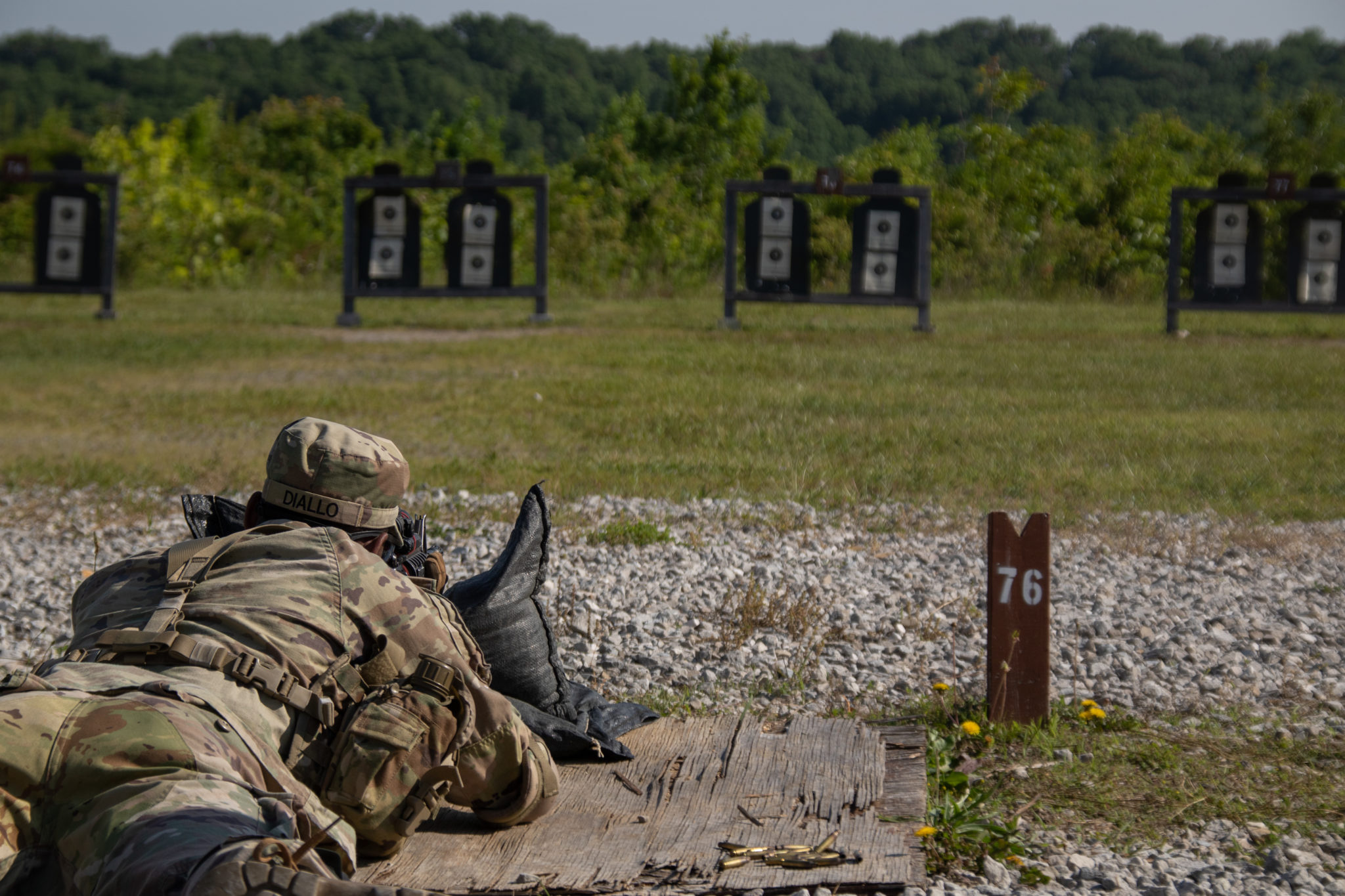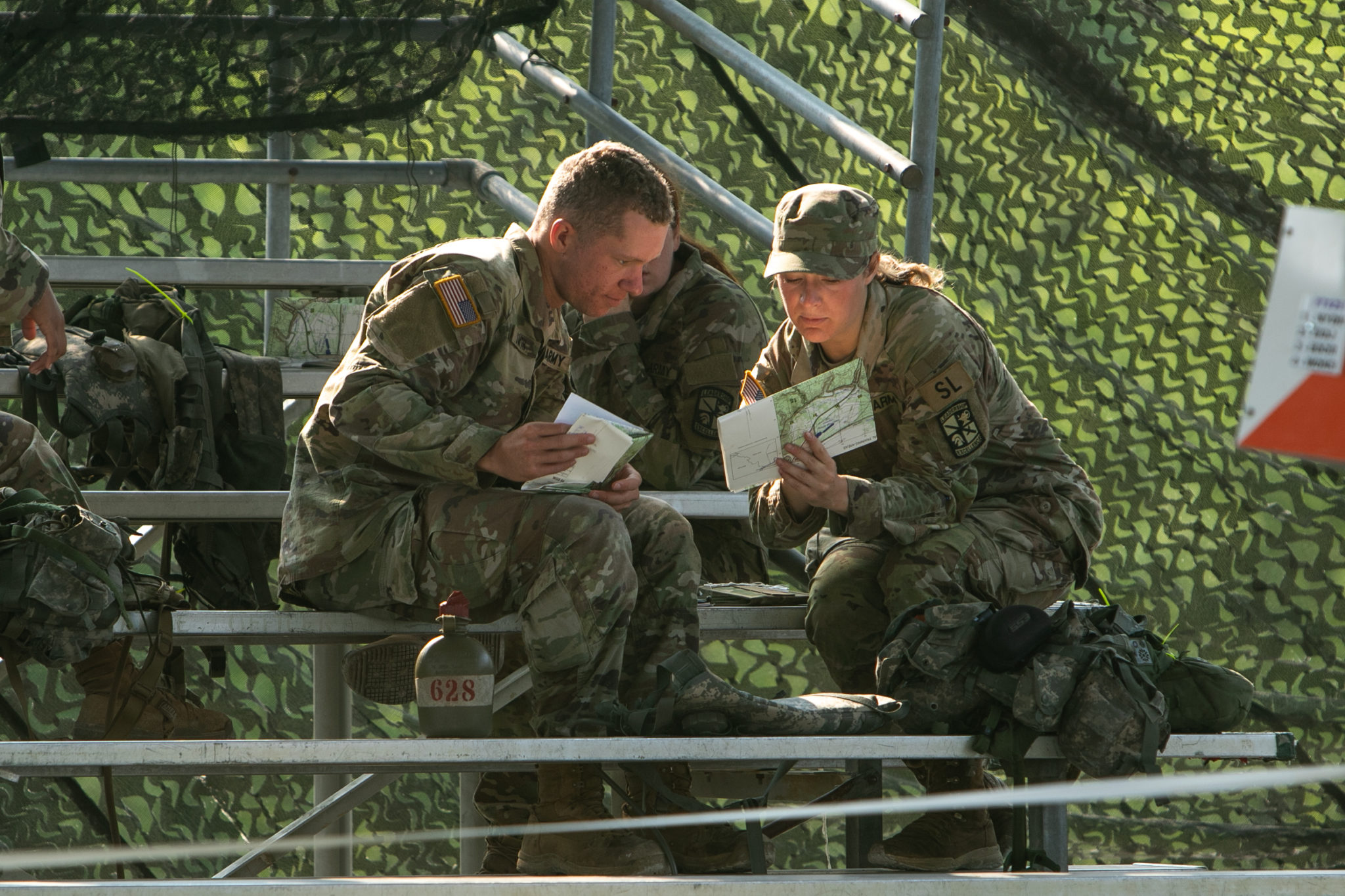FORT KNOX, Ky.—Cadets of 1st Regiment, Basic Camp, were introduced to new tactics on Tuesday, June 12, at the Christensen Range, Fort Knox, Ky. The training focused on small unit tactics.
The training was broken down into three rotations: individual movement training (IMT), hand grenade training, and a classroom style briefing. Cadets dressed in their field gear and used camouflage face paint, branches and leaves to blend in with their surroundings.

Cadets used Face Paint to camouflage their faces during field training. (Photo by Breanne Ward)
“What we are doing here today is infantry training. A lot of the Cadets are given blanks and are being put in a situation where they are going to be practicing all of the infantry movements that we’ve learned over the past couple of days, low crawl and high crawl positions.” said Cadet Joshua Burley, Grambling State University, La. This is his first year for Cadet Summer Training (CST).
Burley hopes that he can continue to retain all of the valuable information and training that he will be learning at Basic Camp. When he commissions as an officer, Burley wants to be confident that he is well prepared to be put in to a position of leadership and feels that he can gain that confidence from his CST training.
“Leadership is basically servantship, putting others before yourself. That’s basically the definition of what Soldiers do.” said Burley. “ We do this by putting our ideals of freedom, our ideas of patriotism before ourselves, and we want to uphold those values.”
When Burley is not attending CST or training to reach his goal of being commissioned in the Army, he is an actor, co-chair of media relations at Grambling State University and an Honor Society Member.
Staff Sgt. Nicholas Moffitt, drill sergeant, 397th Regiment, 95th Training Division, Lexington, Ky, was one of the instructors on the IMT lanes Tuesday morning. When he is not helping with CST, Moffitt is the Non-Commissioned Officer in charge (NCOIC) for his Brigade’s S-4 shop.

Cadets yelled things like “Cover me! I’m running! I’m down!” to signal to their battle buddies that they were running different types of rushes in the IMT lanes. (Photo by Breanne Ward)
“We are teaching them low crawl, high crawl and how to do three-to-five-second rushes. The biggest thing is from my perception of it, after having war transition training from when I was on active duty, is to get both Cadets to work together—one with communicating and one with how to address each scenario.” said Moffitt.
As Cadets go through the IMT lanes, they carry weapons containing blank ammunition; three-to-five-second buddy rushes as well as calling out phrases such as ‘Cover me!’ ‘I’m running!’ and ‘I’m down!’ to communicate between themselves and properly complete the training lane.
Moffitt hopes that Cadets gain the basic knowledge and terminology that they need to be successful in IMT from his guidance and carry that on into their future.
“I think that leadership is beyond a rank, beyond a position. I think it’s you being there for somebody whether they’re good at it or bad at it. It’s being able to address things that need to corrected and worked on and incorporating that in to your training.” said Moffitt. “The biggest part of being a leader is that you’re able to address those things, apply them, correct them and train with them; then get that knowledge to your other soldiers and officers.”
Cadet Summer Training will bring 8,200 Cadets through Basic and Advanced Camp this summer on Fort Knox. These camps are designed to help challenge, grow and improve various skills and leadership qualities within the Cadets. If you think you have what it takes to be a Cadet or if you are interested in a job after college click the following link: https://my.goarmy.com/info/rotc1/index.jsp?iom=IP08-AUTO-R1NA-BR-XXX-XX-XXX-MO-XX-X-BRCMAC:IP08




